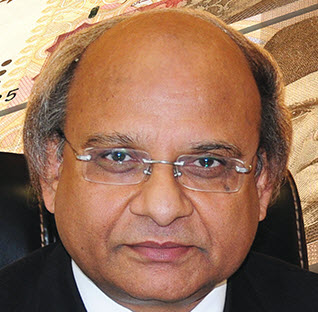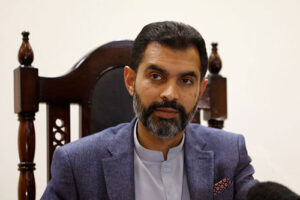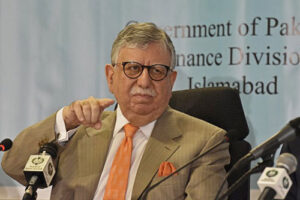
Renowned economist and former advisor to the Ministry of Finance. Currently he is the Principal & Dean at the NUST School of Social Sciences.
The Pakistan Tehreek-e-Insaaf (PTI) government inherited a battered economy when it assumed power in August 2018. Since then, it has been in a fire-fighting mode to keep the economy afloat. Many of its tough measures are now bearing fruits in the form of increased economic activity. But increased demand has its own challenges for a weak economy like Pakistan. Narratives Magazine asks some crucial questions from Pakistan’s leading economist Dr. Ashfaque Hasan Khan, the principal and dean at the NUST School of Social Sciences, who once served as an advisor to the Ministry of Finance.
Is a new balance of payments crisis looming over the country? Will it be as grave as the one witnessed in 2018 when the PTI government came to power?
There are signs that we are heading towards the 2017-18 type of crisis. The way our imports have been rising in the last quarter, it seems that another balance of payments crisis is knocking at the door. Imports have been over 5 to 6 billion dollars per month, which means that our imports will be somewhere around 65 to 70 billion dollars in the current fiscal year. During the last quarter (April – June), our imports have grown by 73 percent in comparison to the corresponding quarter of last year, which is certainly not a good omen for the balance of payments in 2021-22.
Exports have also risen but it was mainly because of the hike in the prices of export items in the international market. This increase in exports was not because of the rise in the quantity of our exports but because of the increase in the prices of the exporting commodities. It is the failure of our commerce ministry that it could not increase the quantity of our exports and hence failed to realise the benefits of higher prices of our exportables.
If the rising trend in imports is not curbed, we can see another balance of payments crisis emerging in the current fiscal year. We need to aggressively curb the import of non-essential items like mobile phones, cars, foods and fruit, shampoo and food for pet animals, costly chocolates and cheese, expensive cosmetics etc. We have slashed duties in this year’s budget to encourage people to import cars. We need to have an aggressive yet selective import compression policy. I am happy that the Prime Minister has recently taken note of this rising import bill and has asked the ministries of finance and commerce to take action to curb unnecessary imports. I have been saying for the last three years that we need to bring down our import bill by curtailing non-essential/luxury imports.

In the current fiscal year (2021-22 June-July), what remains the biggest challenges for the economy?
I mentioned the balance of payments issue. Let me talk about another matter.
This financial year was progressing well. The economy appeared to have come back on track and was heading towards growth and stability but some hidden hands from inside the government did not like it. The Governor SBP ignited the fire by playing havoc with the exchange rate once again. At a time when our foreign exchange reserves are rising, there was no economic justification for the Pakistani rupee to be depreciated. On May 2, 2021 our exchange rate was Rs. 152.2 per dollar and foreign exchange reserves stood at $15.77 billion. On August 26, 2021 our foreign exchange reserves reached an all-time high of $22 billion and the rupee depreciated to Rs. 166.2 per dollar. Such depreciation was against the principle of economics. When (foreign) reserves are building up, it means the inflow of the dollar is far more than its outflow. So the surplus (of dollars) is going into reserves and they are building up. When reserves increase, it causes stability in the exchange rate. It goes towards appreciation, not depreciation of the exchange rate. This is not the market-based exchange rate. This is the manipulated exchange rate.
What is the reason for this depreciation? The Governor State Bank was not allowed to increase interest rates, therefore, he is taking revenge by depreciating the currency. At a time when economies around the world are getting out of the crisis caused by the pandemic, there was the need for us to hold the hands of our private sector. But instead of doing that we have kept the interest rate at 7 percent when there is an environment of zero percent interest rate in the world over. So the Governor has decided to take revenge for not letting him further increase the interest (discount) rate. By depreciating the currency, the SBP Governor has added Rs. 1260 billion in public debt during the last three months without borrowing a single dollar.
Currency devaluation will result in inflation. It will fuel inflationary pressures. Pakistan is importing four million tons of wheat and 200,000 tons of sugar. By depreciating the currency, the landed cost of imported wheat, sugar, palm oil, petrol, gas etc. will rise, which will push up domestic prices. The Prime Minister is working hard to reduce the prices of food items. On the other hand, the Governor SBP has damaged the efforts of the Prime Minister. I will urge the Prime Minister to ask his economic team why the currency is being devalued when foreign exchange reserves are reaching an all-time high.

Will Pakistan be able to accelerate its growth? What are the opportunities for the country?
For the fiscal year 2020-21, we have achieved a growth rate of 3.9 percent but this is the figure for eight to nine months. When this number is revised, the growth rate for 2020-21 will be somewhere between 4.7 – 5.0 percent. We should not take these numbers seriously because a massive base effect has taken place. The current year’s growth target was set at 4.8 percent. This number will hover around 3.7 to 3.8 percent in 2021-22, again because of the base effect.
Where do you see the IMF programme heading? Will it be back on track? If yes, will it be a good omen for the country?
The IMF has become very unreasonable. The world economy is passing through a very difficult phase because of the pandemic. Every country is trying to revive its economy. Pakistan should also be doing the same but the IMF is making unreasonable demands. It is asking the government to increase the price of gas and electricity. That means it wants to increase the cost of doing business in Pakistan. It will be counter-productive in this situation. It is the obduracy of the IMF that is affecting its relations with Pakistan.
Pakistan’s tax-to-GDP ratio is again hovering at 10-11 percent. Is the debt problem again becoming unmanageable?
This has been the weakest link in our economy. It has been around 9 to 10 percent and it is still there. For practical purposes, revenue has been treated as a residual item in our budget. It has nothing to do with the level of economic activity.
Practically speaking, there has been massive tax evasion in all the sectors of the economy. Agriculture accounts for 20 percent of our GDP. Do we tax our agricultural income? Does our entire manufacturing sector pay tax? What about services and other sectors? When we are not getting taxes from the major components of our GDP then how can we improve our tax-to-GDP ratio?
During its first three years in power, the PTI government devoted most of its energy to putting the economy back on track by taking tough measures. In the remaining two years, will it be able to ease some burden on the people?
The PTI was lurching from one crisis to another in its first year in power. These crises were created because of its own inexperience. The second year in power was lost to IMF and the pandemic. In the third year, the PTI government started to come out of the economic crisis. And hopefully the fourth and the fifth years will be the years of economic stability and growth. But the Prime Minister should identify the spoilers around him who are bent upon damaging his popularity.
If we compare the current year’s budget with the previous one, what’s the difference?
The direction of the current budget was absolutely right, though the numbers were highly fragile. Since its direction was right, it was appreciated by every segment of society. The difference between the budget of this fiscal year and the previous years of the PTI rule was that the current one was made against the dictates of the IMF. The previous budgets were prepared under the dictates of the IMF, so they were not liked by the people.
By Zeeshan Haider



